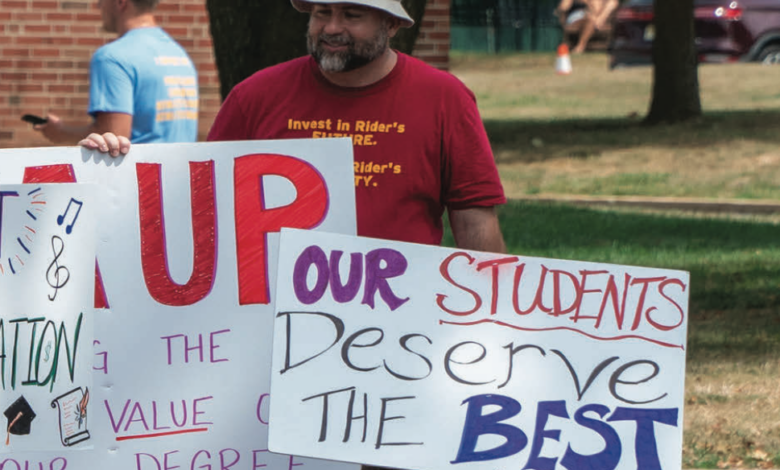
Faculty union ratifies new contract despite concerns
By Shaun Chornobroff
Despite vocal concerns in a Sept. 20 meeting in the Yvonne Theater, Rider’s faculty union moved one step closer to resolving a long-term contract dispute, voting to ratify a tentative contract agreement with the administration that expires in 2027.
Rider’s chapter of the American Association of University Professors (AAUP) ratified the five-year contract that was agreed upon in the previous week, despite some members openly questioning some of the terms of the agreement as well as the direction of the university and its leadership during the Tuesday afternoon meeting.
“While some people weren’t extremely happy with [the deal], they recognized this was the best deal they could get without engaging in a strike,” union President David Dewberry said in a phone interview with The Rider News following the meeting.
Even with the ratification, the union’s long- standing skepticism of Rider President Gregory Dell’Omo and his administration remains intact. Members of the union not only still question the university’s commitment to providing quality faculty and classes, but now their job security as well.
After being protected from layoffs in a pair of one-year contract extensions during the COVID-19 pandemic, the most recent agreement does not have this provision, potentially leaving faculty members vulnerable to losing their jobs.
“That now is gone, so the university can engage in layoffs if they feel it’s appropriate. Of course we would fight that,” Dewberry said.
All faculty who are let go would have to be notified by Oct. 30. Dewberry said he would “not be surprised” if the administration engaged in layoffs, although if any do happen, the union can take the university to arbitration for a third-party to decide if the university has grounds to lay that person off.
Rider’s Associate Vice President for University Marketing and Communications, Kristine Brown, said that no decisions have been made in regards to faculty layoffs due to the school finalizing details surrounding previously eliminated or archived programs.
Fear of layoffs comes as the university is attempting to rapidly cut a debt that was reported to be $7 million when Dell’Omo first arrived at the university in 2015, but surged to as high as $20 million as a result of the pandemic.
After a summer of tense negotiations that led to union protests and demonstrations as well as the threat of a faculty strike, all that is left for the contract to become official is for Rider’s board of trustees to approve the contract.
“We were always going to wait on the union to ratify a contract before scheduling a meeting with the board of trustees. Now that that happened today, we will be scheduling a meeting with the board of trustees, and it will be within the next week,” Rider’s Associate Vice President for University Marketing and Communications Kristine Brown to The Rider News after the agreement.
The union has passed two votes of no confidence since Dell’Omo’s arrival in 2015 and has openly called for the university president to be removed from his job. Rider’s continuing financial difficulties, the elimination of 25 academic programs in June, as well as faculty receiving zero raises in the next two years and only minor raises after that has only magnified the distrust faculty has in Dell’Omo’s commitment to providing educators of a high caliber for the student body.
Members of the AAUP will not receive a pay increase for the next two school years, but will receive a 0.25% pay increase in the third-year of the agreement and a 2% raise in the final two years of the agreement, according to an AAUP contract summary that was shared with The Rider News.
“As our community has heard many times, we must take short term steps for the long term success of the university as a whole,” said Brown. “Our faculty salaries remain highly competitive, and we have seen no indication that the quality of instruction has been diminished by anything we have collectively bargained with the AAUP.”
However, Dewberry emphasized that the agreement’s wage increases are well below the escalating cost of living.
“Who’s going to want to come and work in a place that we haven’t gotten a pay raise with this contract in nine out of 10 years,” said Dewberry. “ … I think some people are concerned the administration just wants somebody in the classroom and doesn’t care if it’s the best people we can get.”


